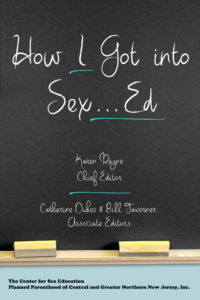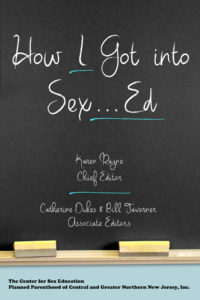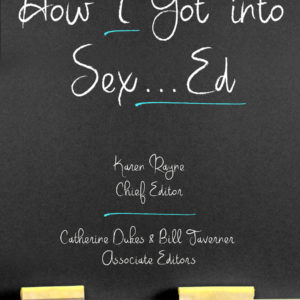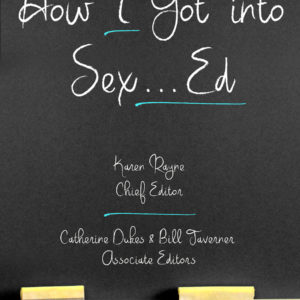We are running excerpts from How I Got Into Sex…Ed. Get a free copy of the ebook here. Order the print book here.
Rachel Billowitz, MPH
How I Got Into Sex…Ed
I grew up in a liberal, progressive family, where we talked openly about current events and politics. My parents were both medical providers, and I was comfortable talking to them about bodies, sex, and health. I had friends in high school who experienced unplanned pregnancies, sexual assault, and unhealthy relationships, and I was acutely aware of issues of gender, sexism, and women’s rights.
When I arrived at college, I knew enough about patriarchy to know that I wanted to find a way to kick its ass. I went to Macalester College in Minnesota, a liberal arts school where social activism was the norm. I found a student group called People for Reproductive Rights Organized (PRRO). These women and men weren’t just sitting around drinking coffee and deconstructing the dominant paradigm; no, they were shakin’ it up. Together we worked on behalf of pro-choice candidates, we offered peer education about sexual health on campus, and we did clinic defense and patient escort work.
I attended college at a time when Operation Rescue was very active around the country. (They’re now called Operation Save America.) This anti-choice group is very militant in preventing women from accessing legal medical services, namely, abortion services. In the early to mid-90s, they led mass protests at clinics that offered abortions, and harassed and intimated women as they tried to enter the clinics. They also blocked clinic entrances by chaining or gluing themselves to the clinic doors, and they would lay down across the entrances of parking lots, making it impossible for patients to enter the clinic property. PRRO would go to clinics around the Twin Cities and escort patients from their cars into the clinics. One day we heard about a clinic in rural Wisconsin that was being targeted for a big protest by Operation Rescue, so we piled into a van and drove there to offer support to the clinic staff and the patients. There were about 400 people assembled, roughly 200 people on each side. The pro-choicers got there first, at 5:30 am, so we made two concentric circles, two layers of a human chain, all the way around the perimeter of the building. We only broke the circle to let patients and escorts in. There was a preacher there, yelling at us, literally thumping his Bible, and he was so close to me that when he shouted, little bits of spit flew out of his mouth and landed on my check. I couldn’t move. I couldn’t let get go and break the chain to wipe it off. So I had to stand there, and I kept chanting, “This clinic stays open! This clinic stays open!”
In that moment something clicked for me: I thought, “This is important stuff. Women should have access to legal medical services. This is worth getting spit on. I’m gonna fight for this for a long time.”
After college, I worked as a healthcare assistant and abortion counselor in three different clinics. It was emotionally draining work, and there was always the threat of risk to my personal safety. I did the work because of the women who I had the privilege of meeting there. I met some amazingly strong women, and it was an honor to be involved in such a pivotal day in their lives. I counseled women about informed consent, educated them about birth control for the future, and held their hands during the procedure. In talking with them, I heard recurrent themes: a lack of understanding about physiology and fertility, a lack of understanding about how birth control works or how to use it correctly, a lack of money to pay for birth control, as well as tales of failed birth control, domestic violence, and coerced sex. I heard the range of emotions that women experienced: guilt, shame, embarrassment, grief, numbness, relief. I saw a lot of relief on women’s faces when it was done. Despite the common threads, their stories were unique, and there were always nuances to the story that I would never be privy to.
My experiences working in abortion clinics confirmed my belief that abortion will always need to be safe and legal. I began to wonder, “How can I help to reduce the number of women who are facing unplanned pregnancies in the first place?” I went to graduate school and earned a Master of Public Health degree, with an emphasis in health education. I had volunteered with Planned Parenthood throughout graduate school, and four months after completing my program, a health educator position opened. I applied for it, was hired, and began my career in sexual health education.
At first I naively thought that this work would be easier to do. Clearly, both sides of the abortion debate could agree on prevention, right? WRONG! I have faced numerous barriers in this work, including lack of funding. This is what is most frustrating to me: The very people who want to restrict access to abortion are the same people who want to restrict access to medically accurate education and family planning services.
Despite frustrations and challenges, I have stayed with the job because I believe in the power of embracing sexuality as part of our humanity. I believe teaching sex ed is a way of promoting social justice. As an educator in northern Arizona for the past 12 years, I’ve had the joy of teaching thousands of students. I have taught in a variety of settings, including schools, community groups, churches, detention centers, group homes, and shelters. I love my job. I love being the one who talks about topics that most people want to avoid. I love helping people understand that they deserve to be healthy and happy, and providing a place for them to explore how to do that. Someone at a conference last year asked me why I teach sex ed, and that got me thinking, so I wrote this piece:
Why I Teach SexEd
For many reasons…
For many people…
For Katie, who visibly relaxed in a puberty education class when I explained that menstrual blood can be brown and not red, and that one breast is often slightly larger than the other.
For Julia, who became pregnant at 14, then miscarried after her “boyfriend” beat her up when she told him the news.
For Caleb, who sat silently during the class on homophobia and how to be an ally, then whispered a quiet “thank you” on his way out the door at the end of class.
For Kevin, who asked if it was okay NOT to masturbate.
For Juanita, who was upset that “vaginal fluids” didn’t have a more special name, and suggested we call them “super fun vagina juices.”
For Matt, who shared with me his idea for a brainstorm activity that asked boys to think of how they can use their strength in nonviolent ways, and for all the boys who gave examples such as “shovel snow for your neighbor” and “help your mom carry in the groceries” when I later led the activity in class.
For Melissa, who prepared her peer education mock presentation on how to perform breast self-exams in honor of her grandmother, who died of breast cancer.
For the person who asked, via the anonymous question box, if putting Skittles inside the vagina
after intercourse would work as contraception.
For Rebecca, who realized through our discussions on healthy relationships that she was not being treated as well as she deserved, and needed to end her relationship, and actually did.
For my sister, and for all parents, who are striving to raise sexually healthy kids in a society filled with unhealthy and unrealistic messages about body image, gender stereotypes, and relationships.
For my mother, who served as a nurse in an abortion clinic and an educator in a college health center, who taught me that it is not just a job when it is one’s calling, who taught me that reproductive healthcare is a fundamental human right that is worth fighting for, and who died before she had a chance to see me fight.
For my father, who taught me that working for social justice is our opportunity as well as our imperative, who is still around today to see me fight, and who tells me he is proud of me.
And for myself, because there is nothing more important to me than figuring how I can help to make the world a more peaceful and just place for ALL!

Want to read other great stories? Get a free copy of the ebook here. Order the print book here.
“How I Got Into Sex…Ed is a treasure! If you’ve ever wondered if this path was right for you or what it feels like to be a sex educator or how to get the right kinds of education, training, or opportunities to work as a sexuality education professional, this book is for you!”
Debby Herbenick, PhD, MPH
Director, The Center for Sexual Health Promotion
Indiana University





